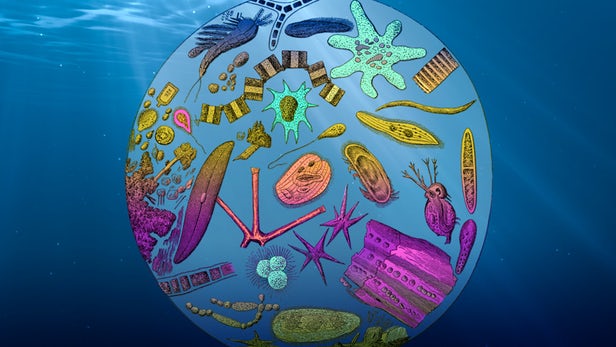The ocean's crucial carbon capture mechanism is slowing down

Photosynthesizing plankton help capture carbon from the atmosphere, but warming temperatures are slowing down the process (Credit: MIT News)
The Earth is actively fighting back against human-induced climate change. Some of the excess carbon dioxide we're pumping into the air is absorbed by "carbon sinks" like forests and oceans, which helps to slow down – but not stop – the greenhouse effect. Unfortunately, a new study has found that oceans are gradually becoming less effective carbon sinks, thanks to rising global temperatures.
Photosynthesizing organisms do most of the heavy lifting when it comes to bailing CO2 out of the air. Forests have stepped up their game in recent years, absorbing more greenhouse gases than usual and helping slow the rise of atmospheric CO2 levels. Meanwhile, plankton at the sea surface are gobbling up carbon in the water, and as they die, they drag it down to the depths of the ocean at a rate of about 6 billion tons a year.
But a study from MIT has found that warming of the waters is slowing down this natural sponging process. That's because photosynthesizing organisms flourish or flounder depending on the water temperatures – and so do respirers, creatures like bacteria and krill that absorb oxygen and release carbon dioxide. While photosynthesizers grow and die faster in colder waters, respirers are more active when it's warmer.
The delicate dance between these two competing yet symbiotic types of organism greatly affects how well the oceans perform as a carbon sink. The team developed a model to measure the "export efficiency" – the rate at which carbon is absorbed into the deep – at different temperatures, centered around the interplay between photosynthesizers and respirers.
"We had a simple way to describe how we think temperature influences export efficiency, based on this fundamental metabolic theory," says B.B. Cael, first author of the study. "Now, can we use that to see how export efficiency has changed over the time period where we have good temperature records? That's how we can estimate whether export efficiency is changing as a result of climate change."
To do so, the researchers gathered temperature data from three different sources, taken every month between 1982 and 2014 and reporting on locations all over the world. Then, they fed that information into their model to estimate the average export efficiency for the planet's oceans every month, and tracked how that changed over time.
Over those 33 years, water temperatures increased at the ocean surface, while the export efficiency decreased by between 1 and 2 percent. That might not sound like a whole lot, but it equates to an extra 100 million tons of plankton remaining near the surface every year.
"We figured the amount of carbon that is not sinking out as a result of global temperature change is similar to the total amount of carbon emissions that the United Kingdom pumps into the atmosphere each year," says Cael. "If carbon is just standing in the surface ocean, it's easier for it to end up back in the atmosphere."
The team says the model has the potential to be used to predict how effective the ocean will be as a carbon sink in the future, but it won't be as reliable thanks to uncertain temperature projections.
The study was published in the journal Limnology and Oceanography.
Source: MIT
